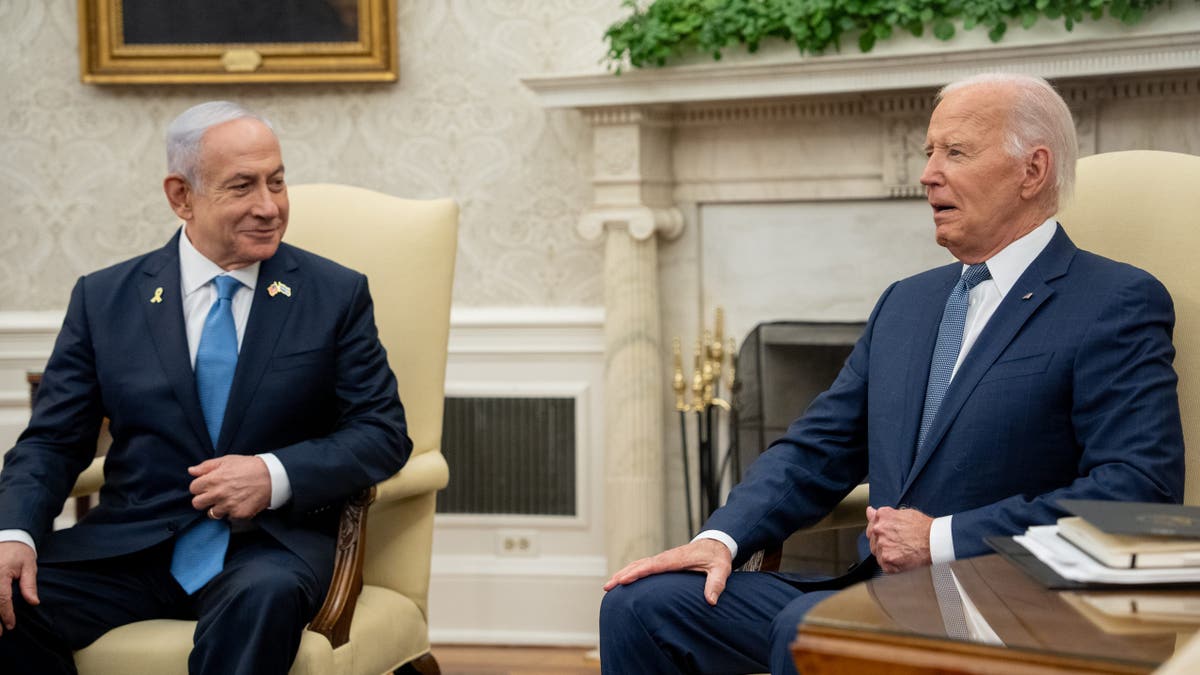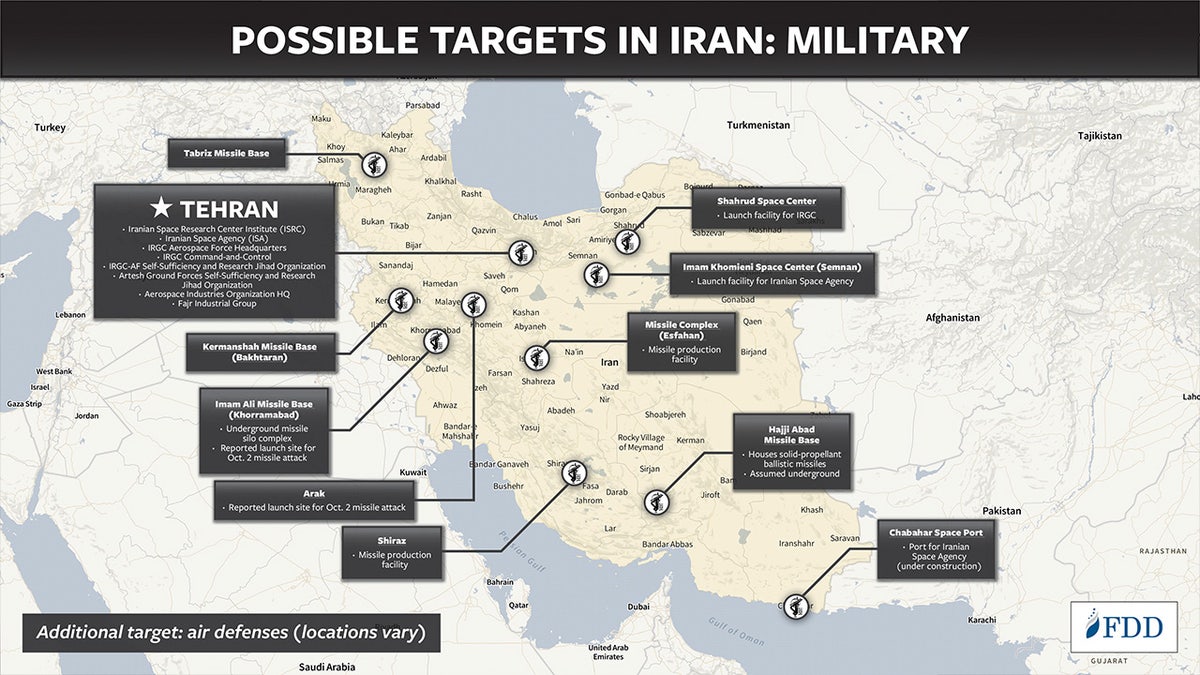Details of the phone call between President Biden and Israeli Prime Minister Benjamin Netanyahu on Wednesday, in which Jerusalem’s pending response to Iran’s attack last week was discussed, remain limited.
A readout of the call noted Biden’s “ironclad commitment to Israel’s security,” adding that Biden “condemned unequivocally Iran’s ballistic missile attack against Israel on October 1st.”
Prior to the readout, when asked about the details of the discussion, Vice President Kamala Harris – who sat in on the call – said she could not discuss “private diplomatic conversations,” telling CNN it was “an important call.”
White House press secretary Karine Jean-Pierre was also short on any details, saying that the pair “continued their discussion on a response to Iran’s attack” and that it was a “straightforward, honest conversation.”
IRAN POSED TO OVERWHELM US BASES IN GULF FORMER CENTCOM COMMANDER WARNS
Israeli Prime Minister Benjamin Netanyahu takes notes during his telephone call with President Biden on Wednesday. (Israeli Prime Minister’s Office)
Following the attack by Tehran, in which the U.S. helped defend Israel against the more than 180 missiles fired at it, Netanyahu vowed to make Iran “pay,” prompting immediate speculation over what the counterattack would look like.
No casualties were reported in Israel, though one Palestinian was killed in the West Bank, and Biden has urged Netanyahu to issue nothing more than a “proportionate” counterstrike.
However, speculation has mounted over the type of attack Israel could hit Iran with, and security analysts have begun reviewing strike options that range from hitting military sites, infrastructure important to the Iranian regime like oil refineries and ports, to even an attack on Iran’s expanding nuclear program.
According to an assessment by the Foundation for Defense of Democracies (FDD), Iran has more than a dozen nuclear installations across the country, including uranium mines, fuel enrichment plants, a reactor and heavy water production plant, as well as several weaponization facilities – all of which could be in Israel’s crosshairs.

President Biden, right, meets with Israeli Prime Minister Benjamin Netanyahu in the Oval Office at the White House on July 25, 2024 in Washington, D.C. (Photo by Andrew Harnik/Getty Images)
However, the U.S. has warned the Israeli prime minister against attacking Iranian nuclear or oil facilities over concerns it could prompt a regional war.
Following Iran’s attack in April, during which it levied some 300 missiles and drones at Israel, Jerusalem responded to Western calls for restraint by hitting Iran’s air defenses and destroying part of an S-300 long-range air defense system.

Many rockets, fired from Iran, are seen over Jerusalem from Hebron, West Bank on Oct. 1, 2024. The Israeli army announced that missiles were fired from Iran toward Israel, and sirens were heard across the country, especially in Tel Aviv. (Wisam Hashlamoun/Anadolu via Getty Images)
However, the precision strike, seemingly muted compared to the missile launch levied by Iran, likely sent a loud message to Tehran after Israel successfully hit one of Iran’s most coveted defense systems, strategically placed in between its nuclear sites.
ISRAEL’S MINISTER OF DEFENSE CANCELS VISIT TO PENTAGON AMID MIDDLE EAST CONFLICT ESCALATION

The Foundation for Defense of Democracies has analyzed where Iran’s nuclear infrastructure is located as Israel mulls a retaliatory attack. (Image provided by the Foundation for Defense of Democracies)
The S-300 system was permanently deployed at the Isfahan Air Base, just 60 miles south of the Natanz enrichment plant and less than 10 miles north of the Isfahan Nuclear Technology Center, two sites supposedly at the core of Iran’s nuclear program, according a report by the Center for Strategic and International Studies.
However, even given the significance of the previous hit, one expert suspects Jerusalem’s response this time will be more “public,” even as Israel continues to butt heads with its biggest ally, the U.S.
“It is unknown what target, or in what order, or with what exact political verse military goal in mind, Israel may choose to strike back at the Islamic Republic,” expert on Iran-Israel security matters and senior fellow with the FDD, Behnam Ben Taleblu, told Fox News Digital.
“What seems certain, however, is that Israel is intent on returning fire and likely in a larger and more public fashion than it did in April,” he said, adding it remains likely that Israel again goes after Iran’s air and missile defense capabilities.
NETANYAHU CONFIRMS NASRALLAH’S REPLACEMENT DEAD: ‘THOUSANDS OF TERRORISTS’ KILLED

The Foundation for Defense of Democracies has analyzed where Iran’s military targets are located as Israel mulls a retaliatory attack. (Image provided by the Foundation for Defense of Democracies)
Tension between the U.S. and Israel has been brewing for months over mounting concerns about the number of civilian deaths in the Gaza Strip, and reports suggested last month the U.S. was kept in the dark over Israel’s alleged pager operation against Hezbollah in late September in which some three dozen terrorists were killed and 3,000 others were injured.
Additionally, Washington fervently warned Israel against any ground incursion into Lebanon, though Jerusalem ignored the international calls to ease fighting and argued its operations against Hezbollah were required to ensure the safe return of 60,000 citizens forced to evacuate from their homes near the border.
Despite U.S. objections over the ground incursion in Lebanon, the U.S. reinforced its troops in the region to better defend Israel ahead of the Iranian attack.

Iranian President Masoud Pezeshkian attends a press conference in Tehran, Iran, September 16, 2024. (WANA/Majid Asgaripour via REUTERS)
Questions over how the U.S. will support or respond to an Israeli attack on Iran remains as unclear as the type of retaliatory strike Jerusalem will throw at Iran.
Israeli Defense Minister Yoav Gallant on Wednesday issued an ominous warning to Iran and said, “Our strike will be powerful, precise, and above all – surprising. They will not understand what happened and how it happened.”
CLICK HERE TO GET THE FOX NEWS APP
Ben Taleblu said Israel’s forthcoming decision on what it decides to strike will “tell analysts a great deal if Israel envisions this to be an operation verses a campaign,” as well as serve as an indicator as to how involved the Biden administration was in the counterattack.
“Israeli military planners, in my estimation, are likely to be exploring options that enable them to do as much damage while keeping the U.S. on board,” he said. “But Israel’s ability to signal the vulnerability of Tehran’s nuclear weapons enterprise through other and more creative means ought not to be minimized.”
Source link






































Add comment